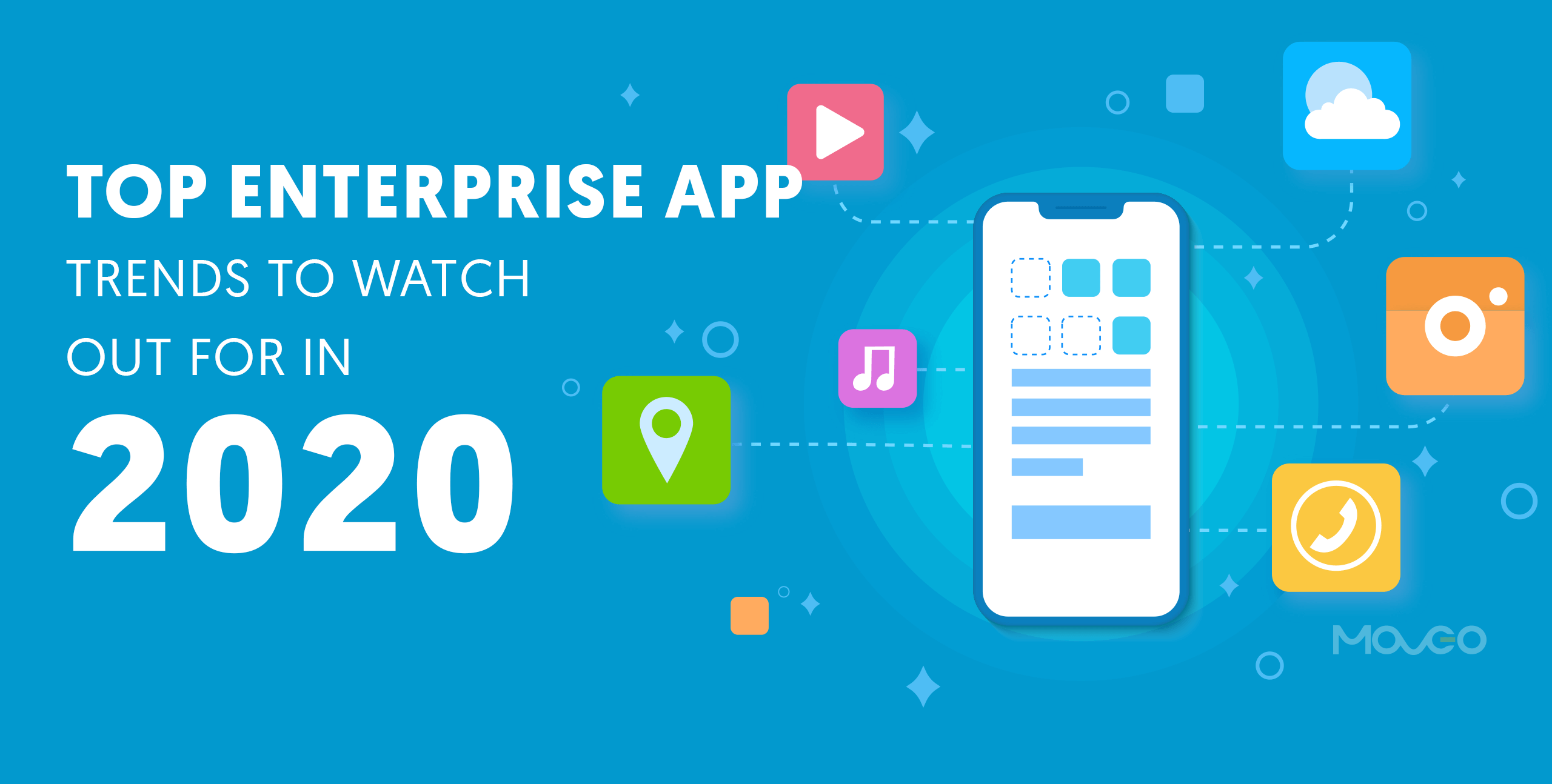Companies that have been smart to adopt enterprise applications over the last few years have seen tremendous growth in productivity, streamlining of processes, reduction in working capital, remote working, enterprise mobility, customer satisfaction, and sales and revenue. It is no surprise that enterprise apps are only going to get ever more popular in the future and evolve as more powerful solutions to individual business challenges. Be it public domain apps such as Slack, Asana and Basecamp, or a growing number of custom ERP apps that are designed specifically for each individual company, enterprise apps are rapidly becoming a way to improve business results. In fact, according to Grand View Research, enterprise mobile apps will amount to nearly $260 billion by 2022.
As with all things, enterprise apps too are constantly evolving, becoming faster and more powerful. Let’s take a look at some trends that will dominate enterprise app development in 2020, giving businesses more power to run their businesses smoothly and more efficiently.
1. Expect A Lot More Custom Enterprise App Development
Despite a delightful assortment of enterprise apps available already, businesses have very unique needs that often require custom solutions. Say for instance a business needs a quick inventory automation system. With the power of the smartphones that every employee carries, this job could be made a whole lot easier if there was an app on each employee’s phone that allowed them to scan barcodes of all products, thereby automatically entering them into the inventory.
Imagine how much faster this would make the entire process of taking inventory, saving time and minimizing errors, making the entire process automated. This, of course, would require the development of a bespoke app that has necessary pre-loaded information pertaining to that business, and that quickly adds the right barcode to pre-classified data columns. The app must incorporate the right API’s, must have a restricted login only for employees and have very high-security standards to protect the company’s data. Not all existing business apps can perfectly fit each individual business’ requirements and hence, businesses will look to develop bespoke enterprise apps.
2. 5G
Need we say more? While the entire world is holding its breath for 5G, enterprise applications too will see a great deal of improvement in speed, security, and overall adoption. 5G will make remote working so much more efficient, faster and easier which is great news for enterprises aiming for higher mobility. Data from Owl Labs shows that 16% of companies worldwide are fully remote whereas 40% of them have a combination of remote and in-office work culture. Employees are increasingly demanding more flexible work environments and 5G powered enterprise apps will make it easier for companies to make this possible. The result – better talent acquisition thanks to increased enterprise mobility.
On 5G powered enterprise apps, cloud services will be a lot more accessible, enterprise security will be more powerful and AI, ML, VR, and AR will work much more smoothly. IoT, connected devices and wearables will work more efficiently and the entire enterprise mobility ecosystem will work much more swiftly thanks to 5G in enterprise apps.
3. AI and ML will Make Enterprise Apps More Intelligent
While AI and ML in mobile apps are hardly news, enterprises bogged down by legacy software and complacent systems have been a tad slow in adoption. However, enterprises are some of the most eligible candidates when it comes to advanced AI and ML-powered mobile apps. Businesses need to communicate with co-workers and clients from all over the world and an internal communication app with prompt language translation can be immensely helpful. Data visualization, employee training and onboarding, data analysis, employee chatbots and a number of other mobile technologies can leverage artificial intelligence and machine learning for automating tasks and streamlining processes. AI and ML integration into bespoke enterprise apps will make all this and more not only possible but rather widely prevalent.
4. Accelerated Development Lifecycles
With the increase in demand for custom enterprise apps, developers will be required to build ways to develop apps faster. Custom enterprise solutions require the undivided attention of a development team for the duration of the project. To meet client expectations and quality standards, enterprise app developers will need to tap into smarter resources and reduce development cycle durations. This requires finding accelerated solutions to developing, deploying, testing and securing enterprise apps.
5. Cross-Platform Development
Accustomed to legacy software, enterprises have been inclined to choose native when dipping their toes in mobile app development. However, in keeping with the last point, accelerated enterprise app deployment will require companies to adopt cross-platform development. React Native, Flutter and a number of advanced frameworks now enable developers to develop apps and deploy on both platforms – iOS and Android – in a fraction of the time without compromising on quality. Enterprises will see the benefits of going hybrid and adopt cross-platform enterprise apps more readily in 2020.
6. Increased Focus on UX And Design
Back in the day, enterprise apps were considered workhorses that needed little thought to design, usability and aesthetics. It was designed to please the stakeholders as they were the ones paying for development and needed to just get the job done. The employees were more like a captive audience who had no choice but to use the institutionally accepted tech solution, no matter how drab and convoluted the design was.
Today, employees are a lot more picky with their choice of work and retaining good talent requires businesses to focus on giving their employees effective enterprise apps that look as good as the consumer apps. After all, employees today use a dozen highly competitive consumer apps every day and are accustomed to very high standards of design in their personal life. It is obvious that they expect nothing less from the enterprise apps that they have to use day in and day out at work. Consequently, businesses will have to focus on developing enterprise apps that are on par with the best apps on app stores in terms of design and UX.
Conclusion
The dawn of the new decade will bring with it a bevy of advanced technologies that will impact day to day lives of consumer and employees across the world in unprecedented ways. Enterprise apps can no longer be complacent with legacy software and decade-old designs. Businesses will see the value in using enterprise mobile apps to rapidly boost employee productivity, enterprise mobility, workforce automation, customer service, and ROI.
Are you looking for a custom enterprise app solution?
Our team can build a bespoke app designed specifically to automate your business saving you precious time and money, minimizing errors and boosting efficiency and productivity. Schedule a free consultation today.










